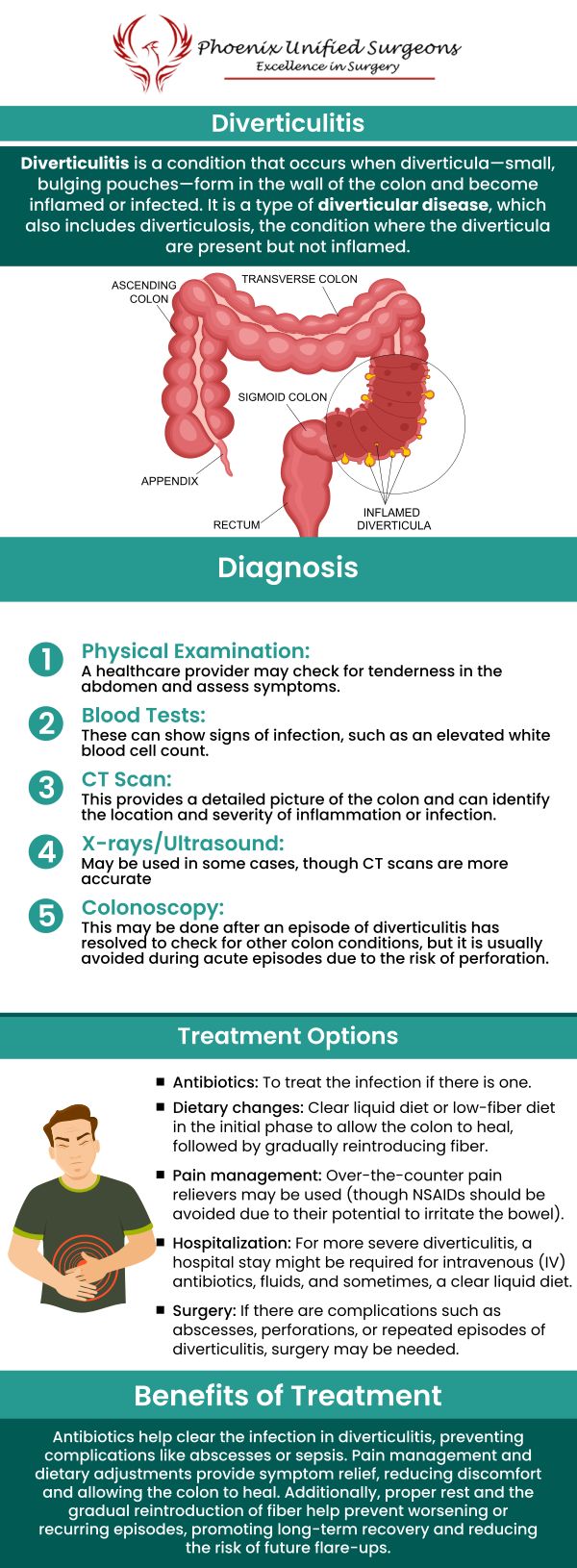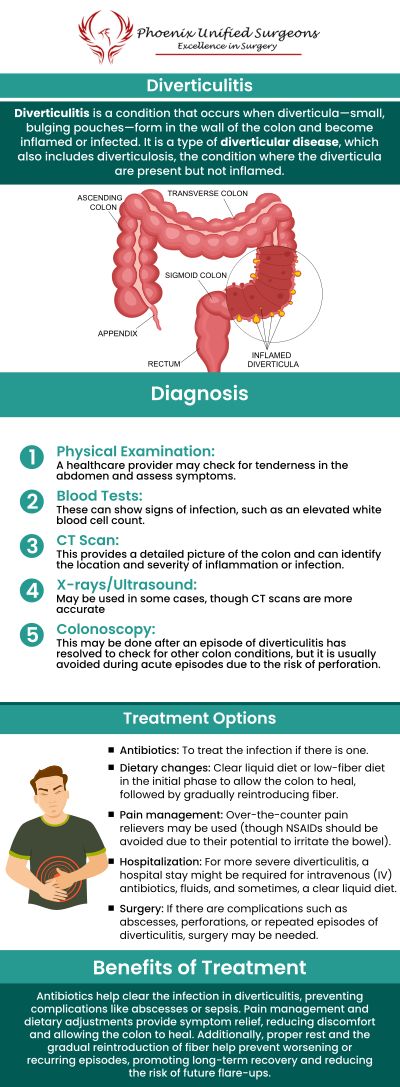What You Need to Know About Diverticulitis and Its Impact
Diverticulitis arises when diverticula, small pouches in the colon wall, become inflamed or infected, often leading to persistent lower abdominal pain, fever, bloating, nausea, and changes in bowel habits such as constipation or diarrhea. Understanding the impact of diverticulitis is essential for maintaining digestive health and preventing long-term complications. Dr. Debora J. Fox-McClary, M.D., MBA, FACS, FASCRS, and her team help you better manage and understand this condition at Phoenix Unified Surgeons. For more information, contact us or schedule an appointment online. We are conveniently located at 20333 N 19th Avenue, Ste 230, Phoenix, AZ 85027.




Table of Contents:
How does diverticulitis affect the digestive system?
How does diverticulitis impact overall health and well-being?
Are there any preventive measures to avoid developing diverticulitis?
How do you know if diverticulitis is severe enough for surgery?
Diverticulitis occurs when small pouches, known as diverticula, form and become inflamed in the lining of the colon. This condition is particularly common in older adults and can lead to severe abdominal pain. At Phoenix Unified Surgeons, we prioritize early diagnosis and effective management to alleviate these symptoms and prevent complications.
Our multidisciplinary approach involves a thorough evaluation of your condition, utilizing advanced diagnostic tools to assess the severity of the inflammation and any potential complications. With expertise in both surgical and non-surgical treatment options, our surgeons work closely with you to develop a personalized treatment plan. This may include dietary modifications, medication, and, when necessary, surgical intervention to address complications like abscesses or perforations.
If you are experiencing symptoms of diverticulitis, such as severe abdominal pain, fever, or changes in bowel habits, we encourage you to seek medical attention promptly. We are here to provide the expert care and support you need to maintain your digestive health and improve your quality of life.
At Phoenix Unified Surgeons, we understand the complexities and challenges associated with managing diverticulitis, a condition that significantly affects the quality of life for many of our patients. Our team of experienced surgeons is dedicated to providing comprehensive care for individuals dealing with this condition, ensuring that each patient receives personalized treatment and support tailored to their specific needs.
We recognize the profound impact these symptoms can have on your daily activities and overall well-being. Our practice is committed to helping you manage these challenges through a combination of advanced medical treatments and compassionate care.
For patients experiencing severe or recurrent diverticulitis, our skilled surgeons are equipped to perform necessary surgical interventions to address complications like abscesses, fistulas, or perforations in the colon. We prioritize minimally invasive techniques whenever possible to reduce recovery time and enhance outcomes.
Early diagnosis and ongoing medical attention are crucial in minimizing complications and improving your quality of life. Our commitment is to enhance your physical, emotional, and social well-being, empowering you to lead a healthier, more fulfilling life despite the challenges of diverticulitis. Trust our board-certified surgeons to be your partner in navigating this journey with expertise and empathy.
Tailored Dietary Modifications:
• Increase Fiber Intake: Our team emphasizes the importance of a high-fiber diet as a preventive measure against diverticulitis. Fiber aids in smooth digestive functioning by adding bulk to stools and promoting regular bowel movements, thereby preventing diverticula formation. We recommend incorporating fiber-rich foods like fruits, vegetables, whole grains, and legumes into your diet. Gradually increasing fiber intake and ensuring adequate hydration are key to avoiding discomforts such as gas or bloating.
• Hydrate Adequately: Staying well-hydrated is essential. Drinking sufficient fluids, especially water, enhances fiber’s effectiveness in the digestive system. Proper hydration helps soften stools and facilitates their passage, reducing strain on the digestive tract. Consider including herbal teas and clear broths as part of your daily fluid intake.
Customized Lifestyle Changes:
• Regular Exercise: Our specialists advocate for regular physical activity as a means to reduce diverticulitis risk. Exercise supports healthy weight management, promotes digestive health, and boosts intestinal motility. We suggest activities like walking, cycling, or swimming for at least 30 minutes.
• Avoid Smoking: Smoking negatively impacts the digestive tract’s lining and function, raising the risk of diverticular disease. Quitting smoking is a vital step in lowering your risk of complications, and our team offers resources to support smoking cessation.
• Manage Constipation: Addressing constipation promptly is crucial. Utilizing laxatives or stool softeners when necessary can prevent straining during bowel movements, a potential trigger for diverticulitis. Our healthcare professionals can provide personalized advice on managing constipation effectively.
• Maintain a Healthy Weight: Obesity adds extra pressure to the digestive tract, increasing the likelihood of diverticular development. Our team can assist you in achieving and maintaining a healthy weight to mitigate this risk.
• Consult with Our Experts: Monitoring changes in bowel habits and seeking medical advice if you experience symptoms like abdominal pain, bloating, or altered stool patterns is important. Early detection and management can prevent the progression of diverticulitis. Phoenix Unified Surgeons is here to provide expert consultations and tailored care plans.
By integrating these dietary and lifestyle changes into your routine, you can minimize the risk of diverticulitis and foster optimal digestive health.
At Phoenix Unified Surgeons, we are dedicated to providing comprehensive care for patients experiencing severe diverticulitis. Diverticulitis is a condition where small pouches, known as diverticula, in the digestive tract become inflamed or infected. We identify specific signs and symptoms that may necessitate surgical intervention:
• Peritonitis: This serious condition involves inflammation of the abdominal cavity, often presenting with severe abdominal pain, fever, and rigidity. Our surgeons provide prompt surgical repair to address this emergency.
• Abscess Formation: When a pus-filled area develops due to infection and does not respond to antibiotics and drainage, our team may recommend surgery to remove the abscess and prevent further complications.
• Intestinal Obstruction: A blockage in the colon can result in severe pain, vomiting, and an inability to pass gas or stool. If non-surgical methods are ineffective, our surgeons may perform surgery to relieve the obstruction.
• Perforation: A perforation in the colon wall can lead to leakage of stool into the abdominal cavity, necessitating urgent surgical intervention to prevent life-threatening complications.
• Bleeding: Persistent or severe bleeding from the colon may also indicate the need for surgical intervention.
Other Factors Influencing Surgical Decisions at Phoenix Unified Surgeons
Our surgical team considers several factors when determining the need for surgery:
• Frequency and Severity of Attacks: Chronic or recurrent diverticulitis that significantly impacts a patient’s quality of life may lead to a recommendation for surgical removal of the affected colon segment.
• Patient’s Age and Health: We carefully assess the risks associated with surgery, especially in older patients or those with other medical conditions, to ensure the best possible outcomes.
• Response to Medical Treatment: If symptoms do not improve with conservative management, our team may discuss surgical options with the patient.
For more information, contact us or schedule an appointment online. We are conveniently located at 20333 N 19th Avenue, Ste 230 Phoenix, AZ 85027. We serve patients from Phoenix AZ, Sun City AZ, Peoria AZ, Surprise AZ, Glendale AZ, Scottsdale AZ, and surrounding areas.
Check Out Our 5 Star Reviews



Additional Services You May Need
▸ Colon & Rectal Surgery
▸ Gallbladder Surgery
▸ Colonoscopy
▸ Wound Care
▸ Hernia Repair
▸ General Surgery
▸ Robotic and Minimally Invasive Surgery
▸ Appendectomy
▸ Colon Repair/Resection
▸ Lipoma & Cyst Removal
▸ Endoscopy and Colonoscopy
▸ Abdominal Pain
▸ Colon surgery for Diverticulitis
▸ Colon surgery for Colon Cancer
▸ Hemorrhoids
▸ Anal Fistulas
▸ Anal Pain Surgeries
▸ Colostomy Avoidance Surgery
▸ Fecal Incontinence Surgery
▸ Crohn’s Surgery
▸ Ulcerative Colitis Surgery






